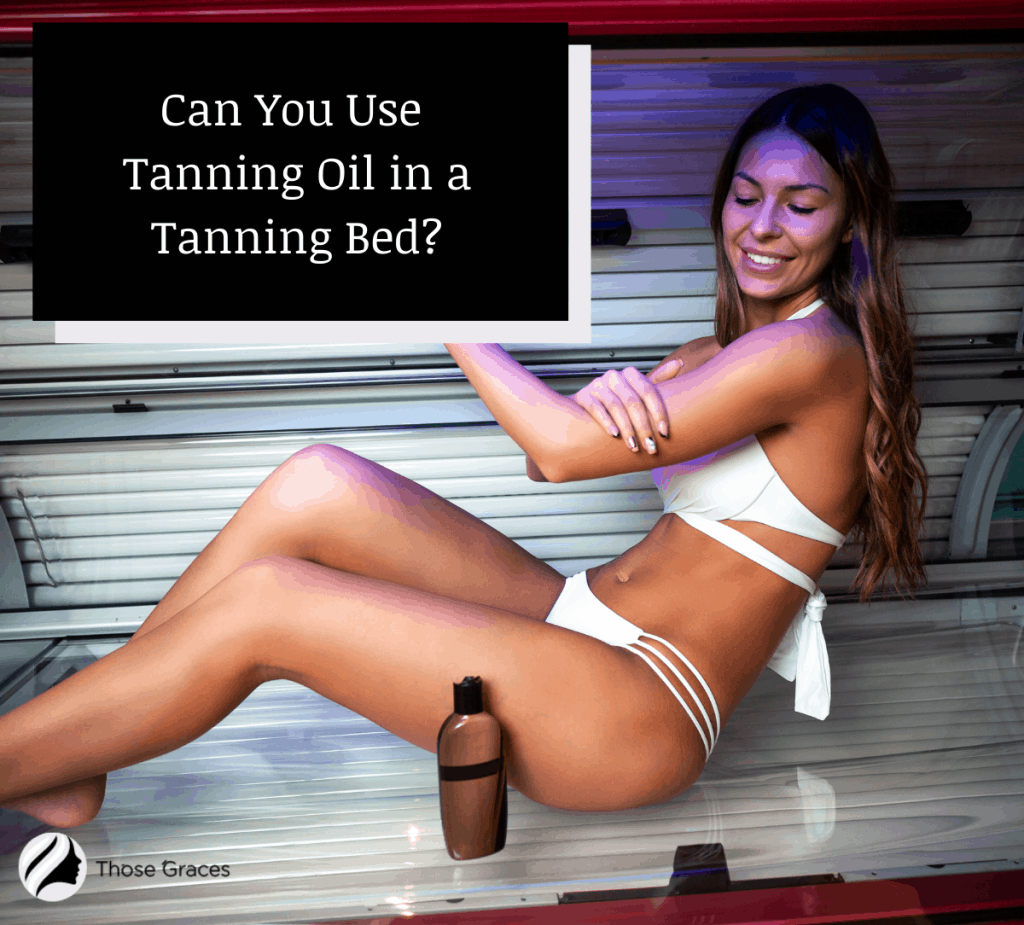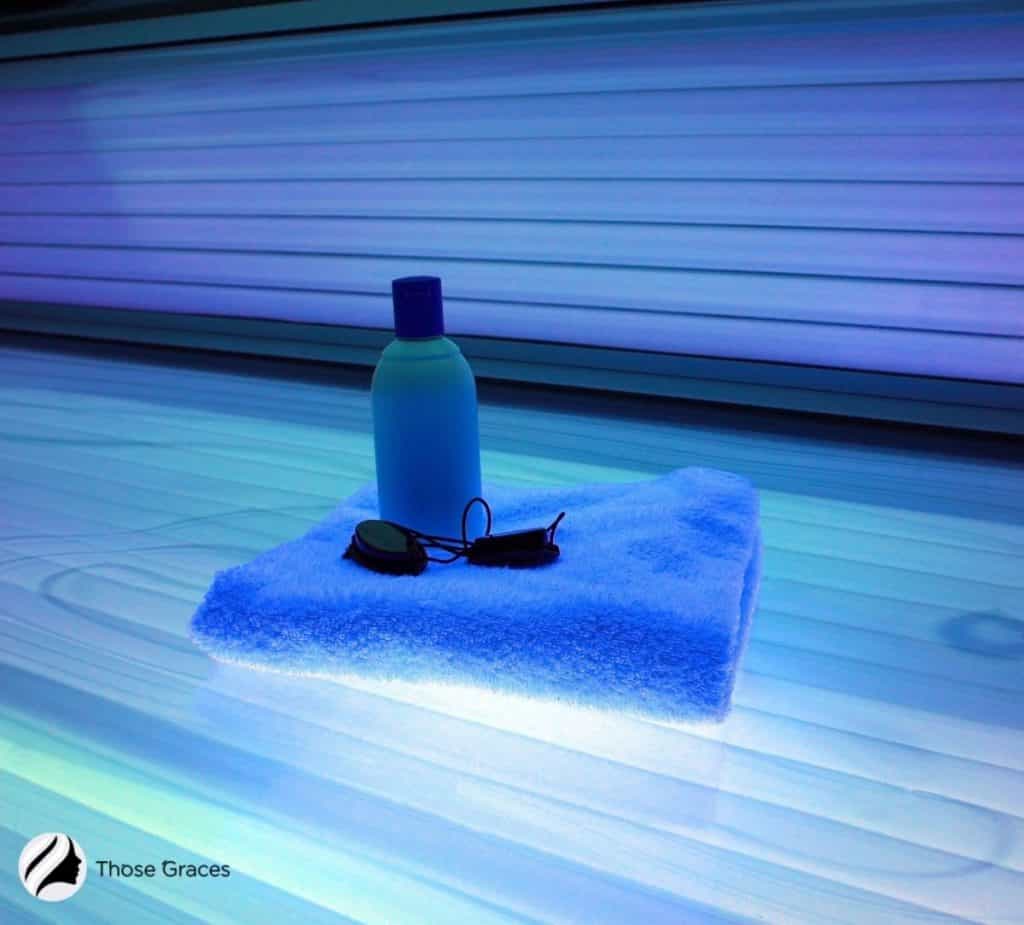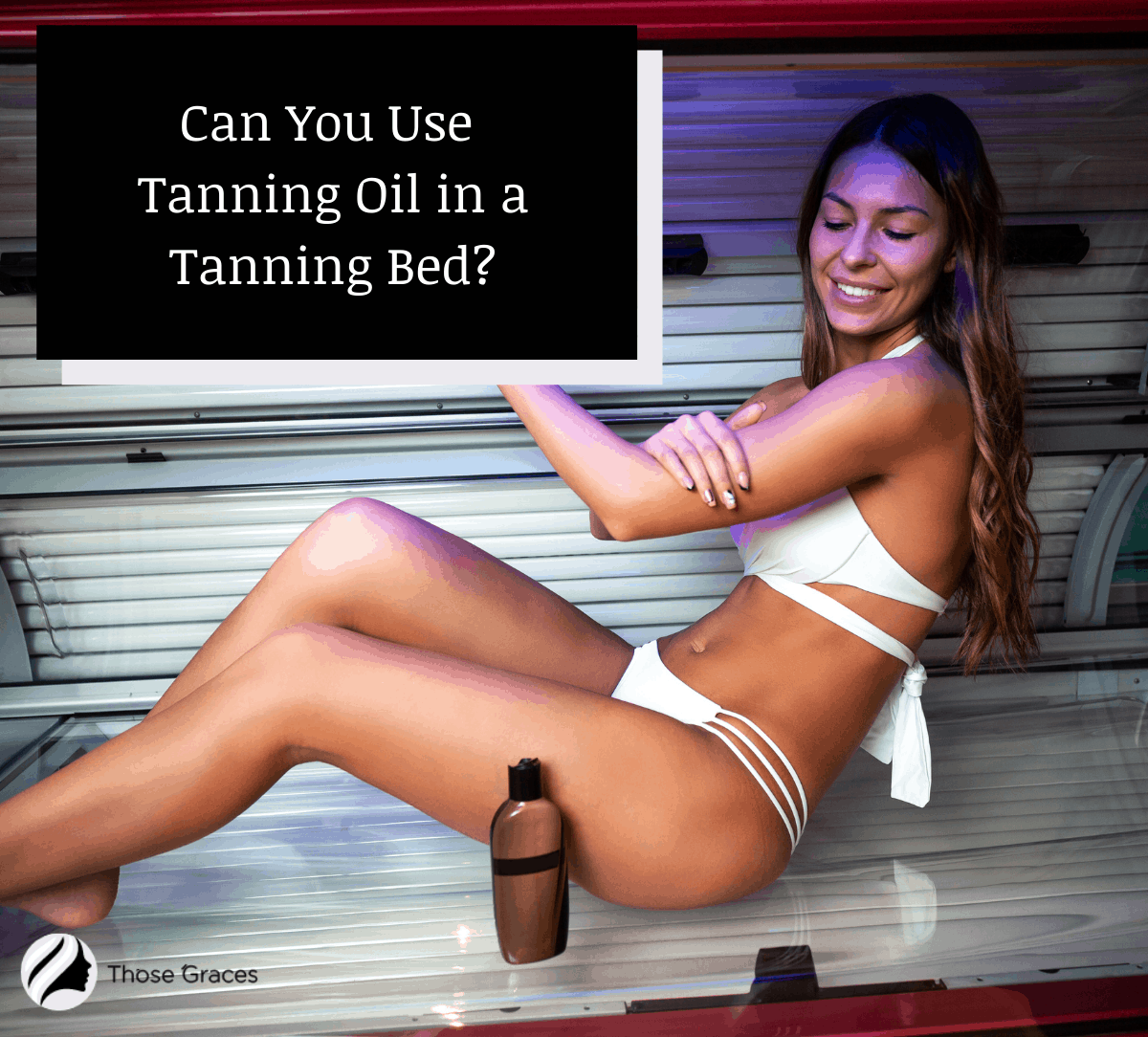‘Can You Use Tanning Oil in a Tanning Bed?’
This is one of those grey areas, but don’t worry, I’ll give you all sides of the stories and ensure you’re not feeling lost at the end.
So, whether you’re a newbie or you just need a refresher on the best products to use during your tanning process, you’ll find the answers you need!
Don’t forget to check our best tanning oil bed reviews too!
Let’s dive in.
Table of Contents
Can You Use Tanning Oil in a Tanning Bed?
Yes, you can oil for tanning in a tanning bed and get a golden tan.
However, all specialists are against it because of its negative long-term effects.
It can put you at risk of serious ailments such as skin cancer.
And while using an indoor tanning lotion doesn’t completely eliminate this risk, it significantly reduces it.

To put it in simpler language, it’s like giving your puppy a chocolate bar (it’s all good until they start vomiting).
That said, you can still use oil for tanning, but you gotta be careful with the ingredients they contain (more on this later).
I know this really doesn’t quite answer your question, but keep reading for a deeper understanding. I promise you I’m getting to it.
ALSO READ: How to Tan Fast in a Tanning Bed?
Is Tanning Oil Safe to Use on Your Skin?
While oils, in general, are typically safe for your skin, when talking about oils specifically used in tanning beds, no, they’re really not.
Yes, you may feel amazing after getting home from your tanning session.
However, things start to take a different turn after a while.
You’ll realize that your skin isn’t so smooth or healthy as it looked on day one.
This is mainly because many tanning lotions don’t have SPF, so they expose you to extreme UV rays.
After a day or two, you might start seeing the impact of the extra UV rays on your skin.

‘If the major problem is low SPF, can’t I just slather sunscreen on top of the oil for my tanning session?’ Well, I’ll give you five points for being clever.
But turns out that adding sunscreen on top of tanning oil makes it ineffective.
But why do people still use oil for tanning if it’s so bad? Does it work? Read the following section to find out.
CHECK: Best Indoor Tanning Lotion for Fair Skin
Does Tanning Oil Work?
Yes, they’re some quality oils for tanning that give a great golden tan, which is why it’s so tempting.
Below are the reasons why tanning oils work and why people continue to use them.

How Does Tanning Oil work
1. It Speeds Up the Tanning Process.
As I mentioned in the previous section, one of its greatest weaknesses is that it has no SPF. Well turns out that’s its greatest strength too.
The oil reflects light and gives you a dark tan very fast.
Other oils may also contain tingling ingredients or melanin that speeds the tanning even more.
PS: Keep in mind that even though tanning oils give you a fast tan, they’re not the safest way of tanning. They’re other safer ways of getting a quicker golden tan that lasts.
2. It Keeps Your Skin Hydrated and Moisturized.
If you’ve tanned during summer and winter, you’ll notice that the winter tan isn’t all glamorous as the summer tan. This is because winter kind of dries out your skin, and moist skin tans better than dry skin.
Quality tanning oils contain ingredients such as sodium isethionate and sodium PCA blend very well with water and glycerin, keeping your skin soft and moisturized for a good tan.
3. It Adds Nutrients to Your Skin.
Besides speeding up the tanning process, some tanning oils have powerful skin ingredients that keep your skin rejuvenated.
Some of these ingredients include natural botanical extract, coconut oil, hemp oil, riboflavin, L-tyrosine, and vitamin E.
With all of these upsides, I bet you’re thinking, “If oil is so terrific in general, why can’t I use it in a tanning bed?” Keep reading, all will be revealed in the next section.
Also check: Complete Guide to Using Coconut Oil for Tanning
Will Oil Damage the Tanning Bed?
If you’re a regular in tanning salons, you may have noticed that most of them (if not all of them) have a strict no tanning oil policy.
And that’s not because they’re mean specialists who don’t want you to get a lasting tan.
It’s because using oils for tanning is disastrous to the tanning bed in the long run.
To understand this, you need to know the components of tanning oils.
Most- if not all-contain L-tyrosine, copper, and mineral oil.
The latter makes up the greatest composition in the tanning oil, and it helps your skin attract UV rays better than it does on its own.

Unfortunately, the mineral oil is a nightmare to the tanning beds, as they degrade their acrylic lining.
This not only affects the longevity of the tanning bed but also makes it ineffective. And to add insult to the injury, the repair costs are very high.
For this reason, it’s best to use a lotion that is designed to be used in tanning beds.
DO NOT try to get around it by sneaking in some oil.
I can almost guarantee you that somewhere in the fine print of the release form you sign, there’s language about how the salon can charge you for damage.
READ MORE: Tanning With Baby Oil: Is it Okay?
Are Any Oils Safe for Tanning Beds?
Oils give a good tan and add a lot of nutrients to the skin, and that’s why people insist on using them.
If you still want to use oil in tanning beds, check ingredients to ensure that it doesn’t have mineral oil.
Also, ensure you consult with a professional before using any oil in beds. This will ensure you don’t end up in trouble with the tanning salon owner.
For example, dry tanning oils can be used in tanning beds, and they contain ingredients that protect your skin from UV rays and premature aging.

Other ingredients to look for in tanning oils include:
- Coconut oil to speed up the tanning
- Glycerin for hydration purposes and avoid over-drying by locking in moisture
- Vitamin E To protect your skin from premature aging, moisturize your skin, and reduce the appearance of wrinkles, dark spots, scars, and other blemishes.
- Sun Protection Factor (SPF) to protect your skin from excess UV rays.
READ MORE: All About Sunbed Rash
FAQ
Here are some common questions that people ask regarding tanning oils.
Does tanning oil make you tan faster?
Final Thoughts
If you’re still wondering if you can use oil for tanning in a stand-up bed, the answer is yes. However, they’re many risks involved because oils attract more UV rays to your skin and don’t contain SPF.
This could lead to premature aging, skin cancer, sunburns, and all horrible things that come with exposing your body to UV rays.
Using tanning oils in tanning beds can also damage the beds causing troubles with salon owners.
If you still insist on using tanning oils, discuss with a professional to ensure you get quality oil that won’t damage your skin or tanning bed.
Do you use oil for tanning in tanning beds?
References
- American Cancer Society. 2012. “Ultraviolet (UV) Radiation.” Cancer.org. American Cancer Society. 2012. https://www.cancer.org/cancer/cancer-causes/radiation-exposure/uv-radiation.html.
- Ghosh, Saswata, and Daniel Blankschtein. 2007. “Why Is Sodium Cocoyl Isethionate (SCI) Mild to the Skin Barrier? – an in Vitro Investigation Based on the Relative Sizes of the SCI Micelles and the Skin Aqueous Pores.” Journal of Cosmetic Science 58 (3): 229–44. https://pubmed.ncbi.nlm.nih.gov/17598025/.
- “Sodium PCA: The Wonder Ingredient for Skin.” n.d. SkinKraft. Accessed May 26, 2021. https://skinkraft.com/blogs/articles/sodium-pca.

Can you use tanning oil in a tanning bed? What do you think?


